How to Hire a Chief Technical Officer on Demand for Your Startup: [Overview, Process, Tips]
Are you a cofounder or serial entrepreneur looking to hire a chief technical officer for your startup?
Are you looking for a tech executive to provide technical guidance for your workforce?
If yes, continue reading this article to learn the following:
Who is a chief technical officer?
When should you hire a CTO?
What benefits of hiring a CTO?
Challenges to hiring a CTO
Options to hire a technical director
Cost of hiring a chief technology officer
Steps to hire a CTO
And more!
Without further ado, let’s delve into the nitty-gritty of this article in the most simplistic manner possible.
Who is a Chief Technical Officer?
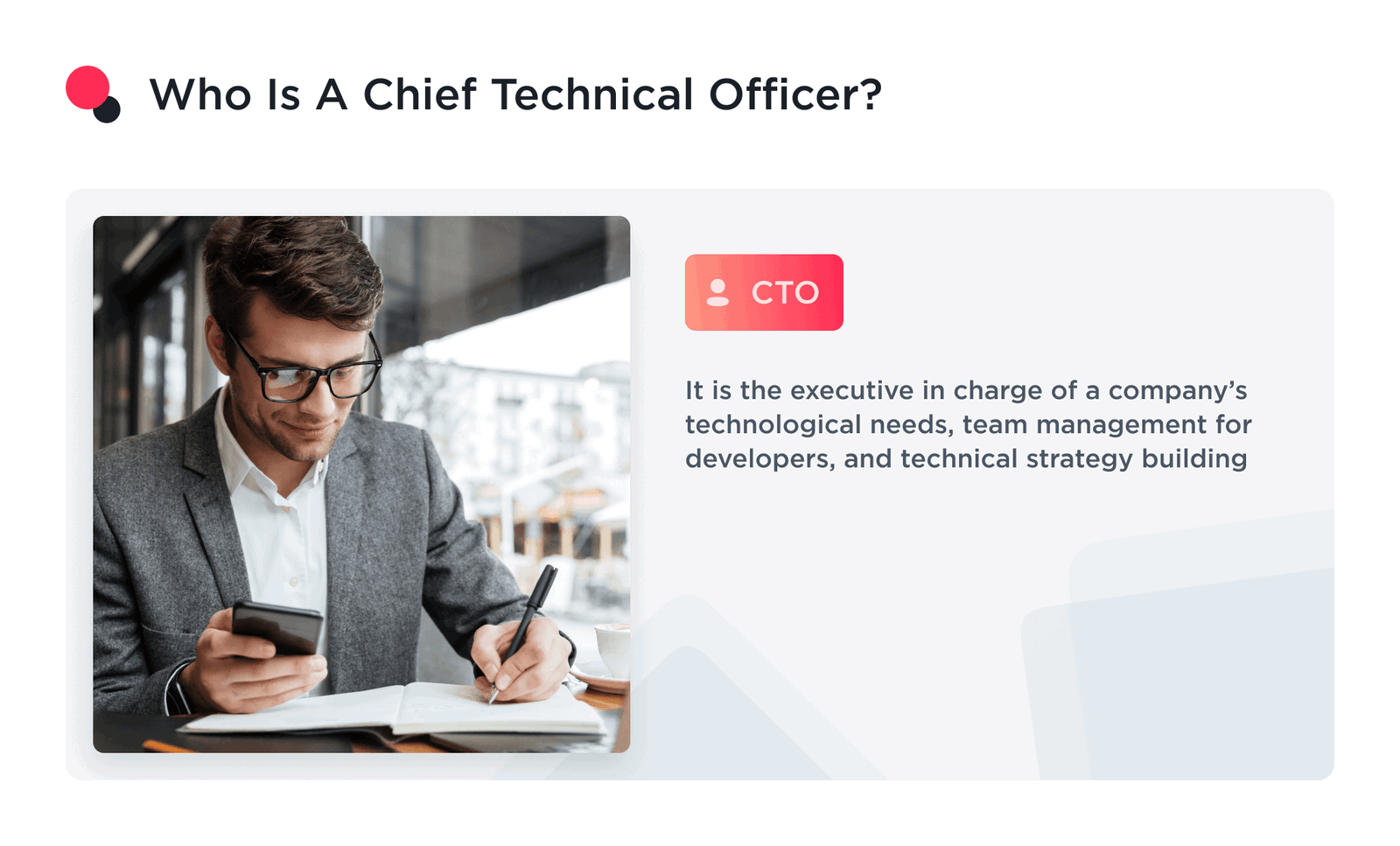
The CTO is a c-level executive overseeing an organization’s technical operations.
They guide other team members, determine which technology to adopt, and map the workflow for all development and maintenance activities.
Zippia research suggests that the US has 23,885 CTOs. A number that’s expected to grow by a 6% CAGR from 2021 to 2023.
Let’s further educate you on what the role entails, and the types of CTO available.
Types of Chief Technical Officers
They are categorized based on the organization’s types and roles. The three types of CTOs are:
Early-stage technical directors
Technical directors at startups.
Late-stage, or large (unicorn) startup technical director,
Each has roles that are distinct from one another. To know what category your CTO needs fall under, we’ll break down what each entails:
Types of CTO | Description |
Early-stage technical director | These technical executives work in early-stage startups, contribute towards idea validation, and double as the lead technology manager and senior developer.They’re solely responsible for choosing stacks for the technical team and often have full-service software development expertise.The skills required to function here areBackend development,user interface integration,Infrastructure design,DevOps,Server management,HR expertise.Team members here range from 0-10 tech talents. |
Technical directors at a startup | These are technical executives in charge of all development and maintenance practices in mid-stage startups. I.e., startups that have raised a series of funding from VCs.A startup CTO with mid-stage startups makes decisions on which technology to adopt or churn out and identifies talents to onboard.Makes decisions regarding budget allocation, regularly audits existing tech stack, and aims at building high-quality solutions at a fast rate.Skills required at this level areTeam leadership,Apt knowledge of the product,SaaS experience (for startups in the niche),Backend development expertise,User interface integration.This type of CTO usually manages a team of 10-50 people. |
Late-stage startup and large (unicorn) startup technical directors | This is the most senior tech executive in large enterprises–usually large-scale startups and unicorns.These CTOs are responsible for improving business profitability, creating a long-term technical strategy, and onboarding tech lead and senior developers.They also maintain all product architectures, maintaining a competitive edge and ensuring talents master new technologies.Skills required to function here are:Product managementExperience maintaining SaaS infrastructure (For saas-centric startups)Ability to set goals and determine corporate visionTeam leadershipCoaching skills.This type of CTO is usually in charge of a team of over 50 employees. |
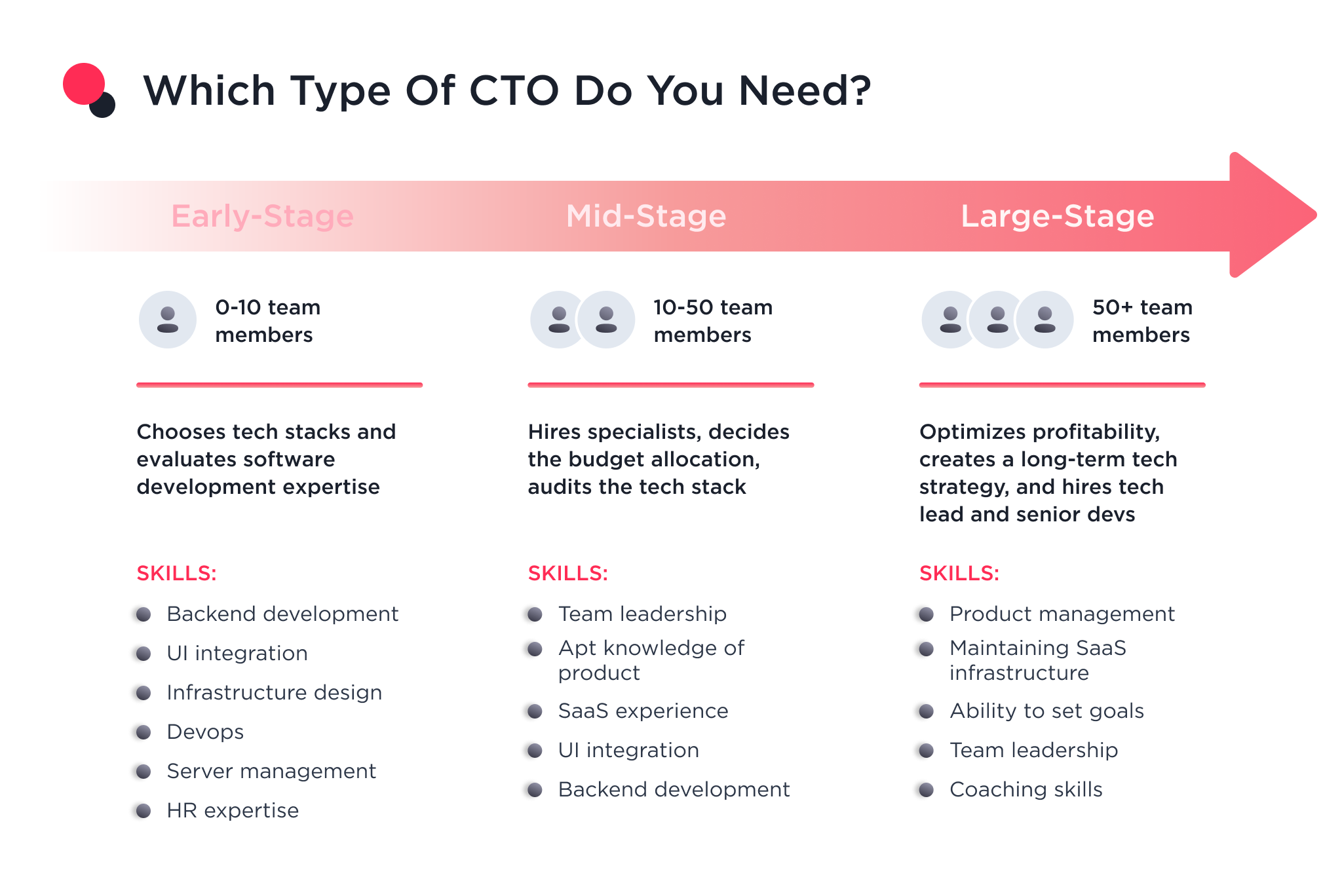
A popular misconception is that CTOs are co-founders.
While in some cases this is not always the case. In fact, for most unicorns, CTOs are employed like other team members.
Let’s break down how both titles differ.
Would you like to hire a technical co-founder for your startup?
Contact us now. We'll be happy to match you with a technical co-founder who will lead you to the results you want. .
What is the Difference Between a Technical Co-Founder and a CTO?
It’s a common misconception to assume CTO, and Technical Co-founders work in the same position. Here’s how they differ:
Technical Co-founder | CTO |
Technical co-founders or technical partners are developers hired by startup founders for that role.Technical-co founders have a flexible contract that allows startups to delay payment until the company goes public, raises funds, or becomes profitable.Responsibilities of a technical cofounder entail managing and expanding the engineering team, having a product strategy, managing MVP production, and drawing up project tech stack. | This is an executive-level staff of the company that’s in charge of all technical processes it embarks on.Generally, the CTO title is used by tech-centric companies creating software products.The responsibilities of a CTO entail team management, defining tech stacks in an organization, managing technical operations, and tracking performance KPIs for the technical team. |
Usually, startups can’t afford to hire a qualified chief technology officer.
And since hiring a professional that’ll opt for a future unguaranteed payment is unlikely, they opt for a more flexible option–-CTO on demand.
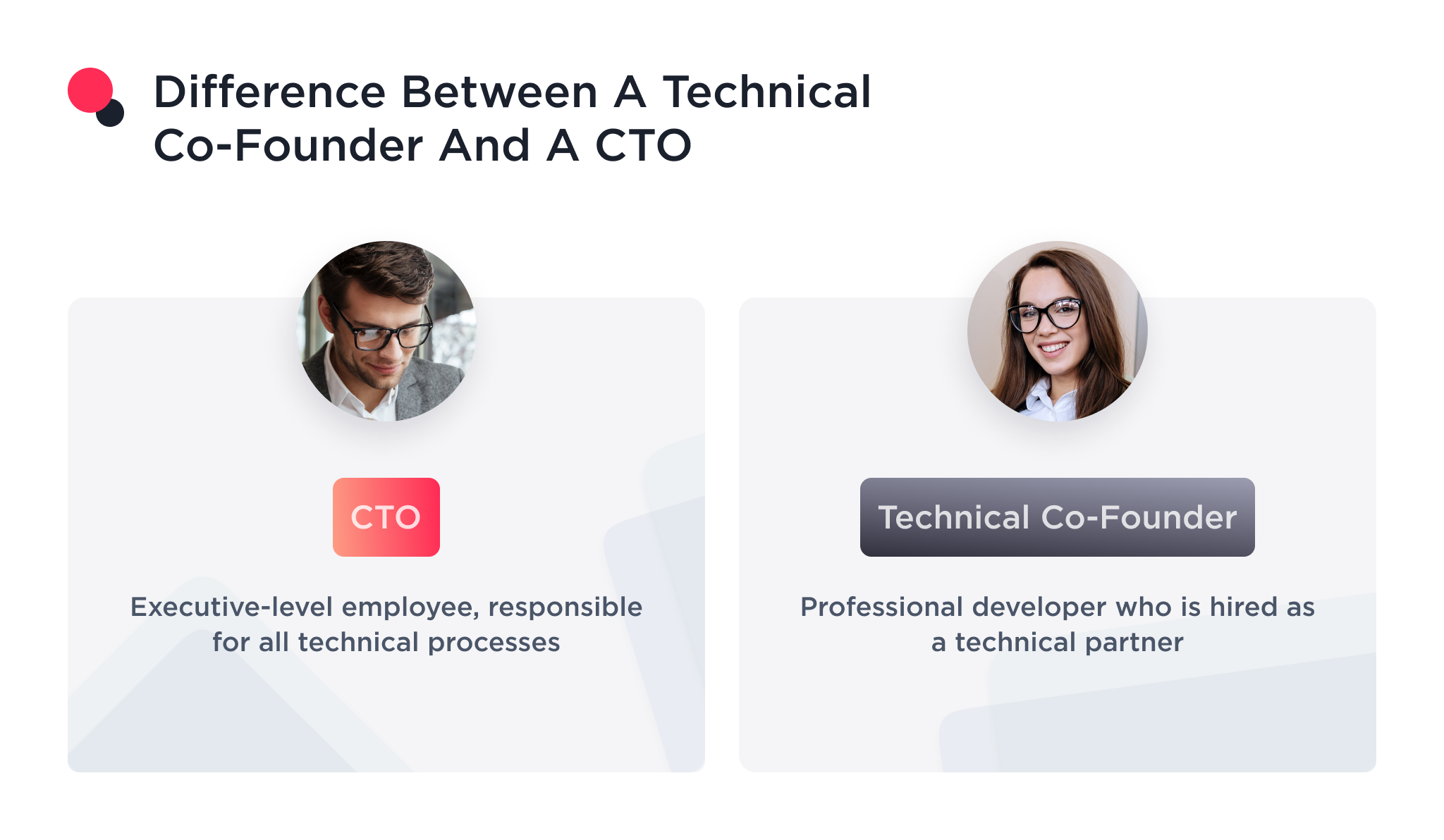
Now that you know what CTO stands for, when exactly do you need one?
Let’s discuss this.
When Is the Best Time to Hire a CTO?
Before you search CTO for a startup online or via your connection, you should first ascertain that you need one.
Before embarking on such a significant hire, here are things to consider:
1. You Need a Tech-executive to Guide your Development Team
It’s time to hire a CTO if you have a large team and need a tech executive with in-depth knowledge of software infrastructure management and tech trends in your niche.
2. You Want to Scale your Business
You should hire a CTO if you’re at a point where your startup is stable and generating revenue, but you need extra effort to scale your offerings.
A Chief Technical Officer will help manage your scaling process by ensuring you use exemplary architecture, build resilient features, and adjust your technology to handle desired growth.
3. You Lack Knowledge of Technical Processes
A lack of technical knowledge can hinder the capacity to monitor and manage your development team.
Hire a Chief Technical Officer that understands the operations and can determine the right technology for your startups.
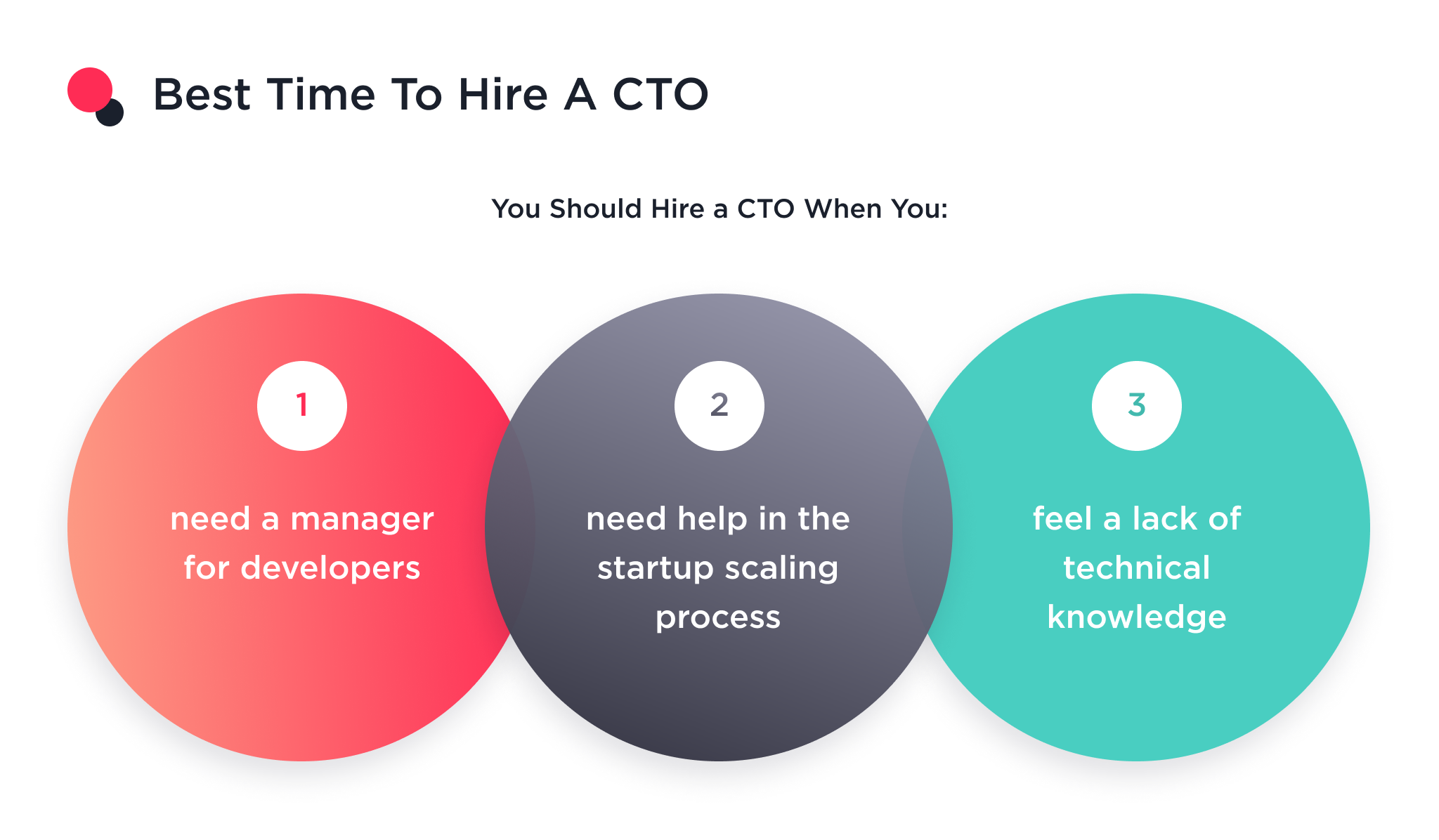
You’re probably wondering what benefit you get from hiring a CTO.
Let’s educate you on this.
Benefits of Hiring a CTO
Hiring a CTO helps your startup have a streamlined development and maintenance strategy.
Beyond that, it also ensures your company works at optimum effectiveness by ensuring the following:
Benefit 1. Development of High-Quality Technology Products
Hiring a seasoned CTO helps you benefit from their years of experience to create high-quality, scalable, and resilient solutions.
CTOs understand the intricacies, code syntax, software infrastructure, and features required to improve the quality of your product.
Benefit 2. Time-Saving and More Flexibility
CTOs help saves time by providing quick solutions to technical pain points.
They ensure codes written are simple and of excellent quality.
Thus, reducing maintenance time and eliminating the need for future code revamps.
Also, you can hire CTO-on-demand for a specified timeframe, as opposed to in-house specialists that you’ll have to hire even during unproductive periods.
Benefit 3. Introduces Objective Opinions
CTOs can give different and sometimes better insight into a technical or business model.
Since they’re professionals, who usually have years of experience working on multitudes of architectures, the opinions they offer can help you edge out competitors.
Benefit 4. Getting Started Without Training
Investopedia reports that most CTOs have over 15 years of experience, which makes them accustomed to all development and maintenance processes.
As such, they can start adding value to your project and team without prior training.
Benefit 5. Deployment of New Technologies
Most CTOs have experience in deploying new technologies and avoid regular unplanned downtimes via incremental testing.
They grasp multiple programming languages and can easily suggest a new technology that guarantees improved speed and security.
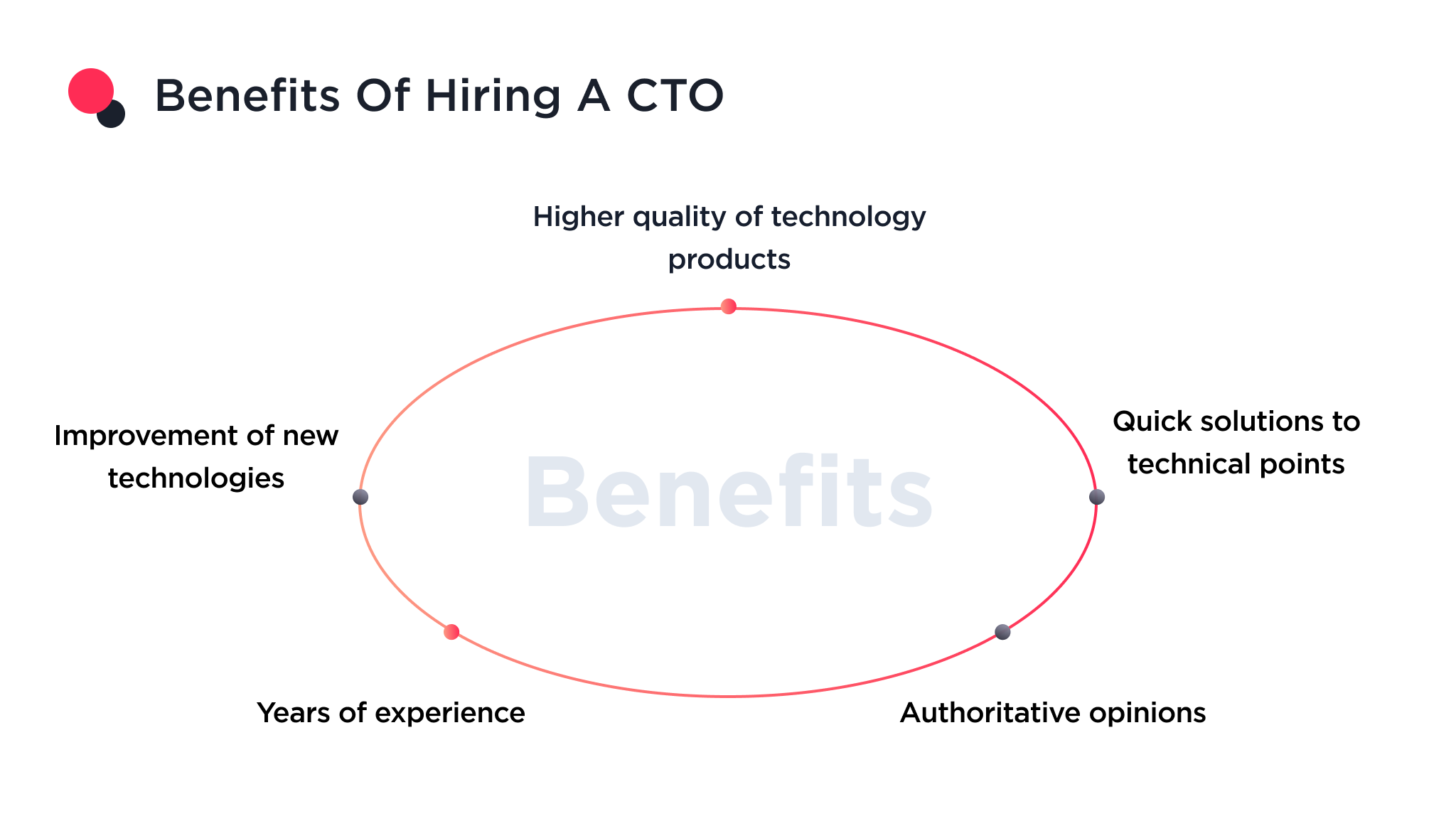
Now that you know the pros of hiring a CTO for your startup, it’s worth noting that it is not always a smooth sail.
There are challenges to hiring a CTO, which we’ll discuss below.
Challenges Companies Face When Hiring CTO
As with any hiring plan, there are always challenges to surmount. For CTOs, startups’ common hiring challenges are:
High salary expectations from potential candidates,
Lack of enthusiasm for working in a startup,
The small talent pool,
Cultural differences,
Trust issues.
Let’s help you understand these issues.
Challenge 1. High Salaries
According to TechCrunch, CTOs earn more than Ceos for early-stage startups.
This exorbitant fee is a significant challenge for startups as hiring an experienced CTO requires a huge budget.
For example, hiring an experienced chief technical officer in the US may cost as much as $250k/year.
This is beyond the budget of many startups, even some investment-backed enterprises.
Challenge 2. Lack of Interest In Working in Startups
A survey by Zippia shows that less than 17% of CTOs work for small-scale startups. Coincidentally, over 99% of US startups are categorized as small businesses.
These two statistics show that most CTOs have a preference for working with fully-established enterprises over startups.
Some reasons for this are due to the prospect of job security, better pay, and a more robust development and maintenance budget.
Challenge 3. Lack of Experienced Talents.
Forbes estimates that the current tech talent shortage will reach 4.3 million by 2030. This shortage is due to the high requirements needed to become a CTO.
It’s one that requires top-notch expertise in a relevant tech stack, an understanding of software architectures, and the ability to lead and direct the technical team.
This is a significant challenge for those finding CTO for a startup company as there are few options to choose from.
Consequently, companies are beginning to look toward onboarding talents from abroad.
Particularly through software development agencies with verifiable proof of excellence.
Challenge 4. Cultural Differences
Cultural differences usually exist between in-house teams and outsourced CTO-on-demand from software development agencies.
This is particularly evident in cooperation between startups in the west and offshore CTOs from India and Africa.
These differences may lead to non-verbal communication barriers, workplace conflicts, and an inability for the CTO to mentor and direct other team members.
Challenge 5. Trust Issues
Due to the sensitivity of the duties of CTOs, they tend to clash regularly with startup founders due to trust issues. A major mistake from the chief technical officer may result in a data breach or downtime.
Thus, founders find it challenging to place absolute trust in a CTO–particularly new hires.
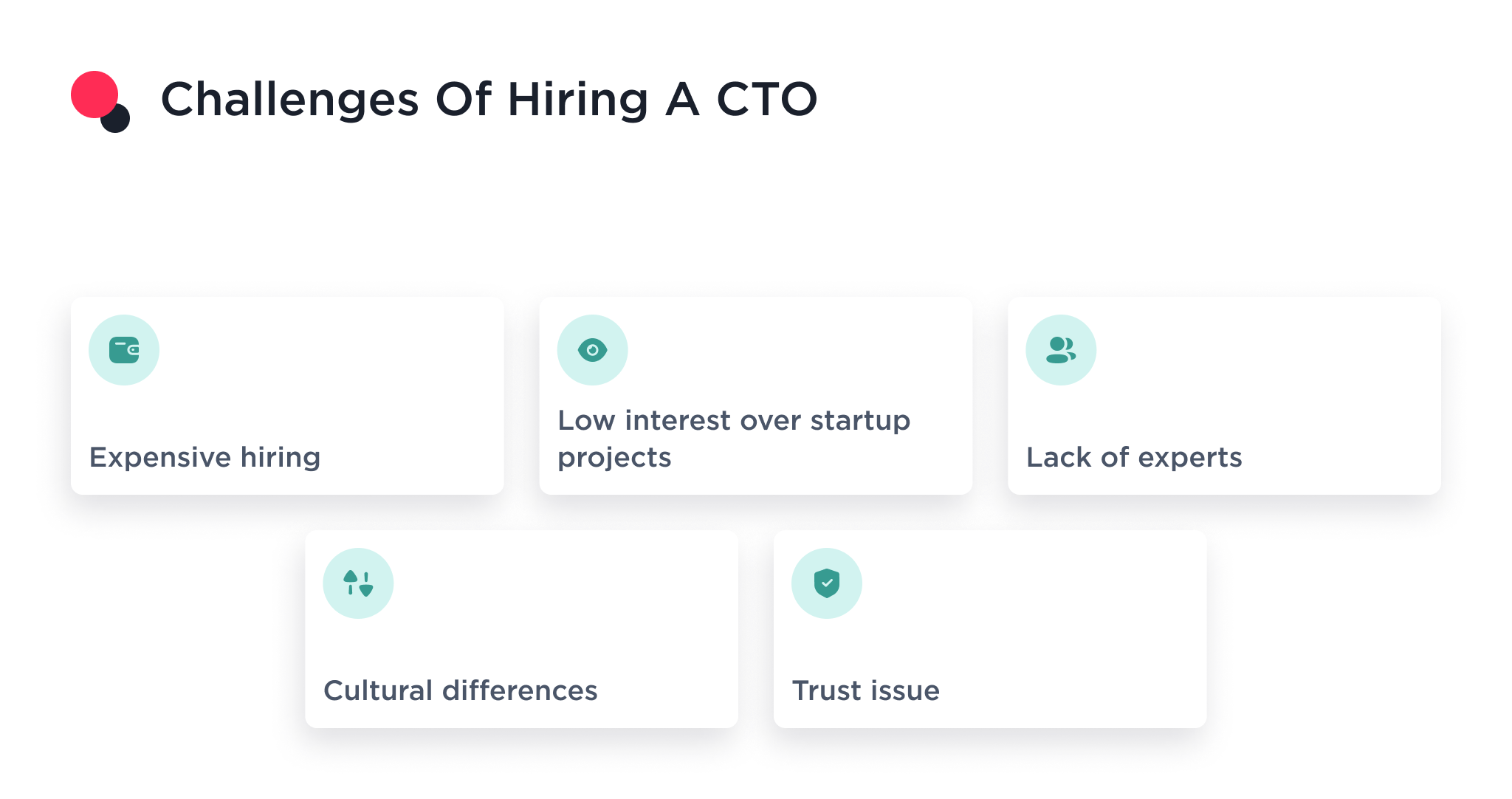
Options for Hiring a CTO
There are many hiring models to explore. Common CTO hiring models available are
In-house hiring,
Technical-director-as-a-service,
Part-time consultant,
Outsourcing.
The most suitable model for you depends on your corporate goals, company type, budget, etc.
Let’s help you make sense of what each entails so you can make more informed decisions.
Option 1. In-house Hiring
This hiring model entails onboarding a chief technical officer through traditional means as a full-time CTO, receiving enumeration from the startup, and reporting directly to the CEO.
The CTO here is an employee of the startup.
This model is more suitable for large enterprises and startups with unlimited budgets that want to keep core management activities indoors.
Consider the following pros and cons before opting for this option.
Pros and Cons of In-house Hiring
Pros | Cons |
A high likelihood that sensitive information is kept a secret,In-house CTOs have a better understanding of the team’s objectives, goals, and culture.The CTO regularly provides one-on-one mentorship with other technical team members–thereby improving their skill set. | The cost of maintaining and onboarding an internal CTO is expensive. This is due to the cost of hiring, purchasing equipment, extra remunerations, and an abundance of hidden costs.It takes time to identify and onboard a CTO willing to work with a startup. |
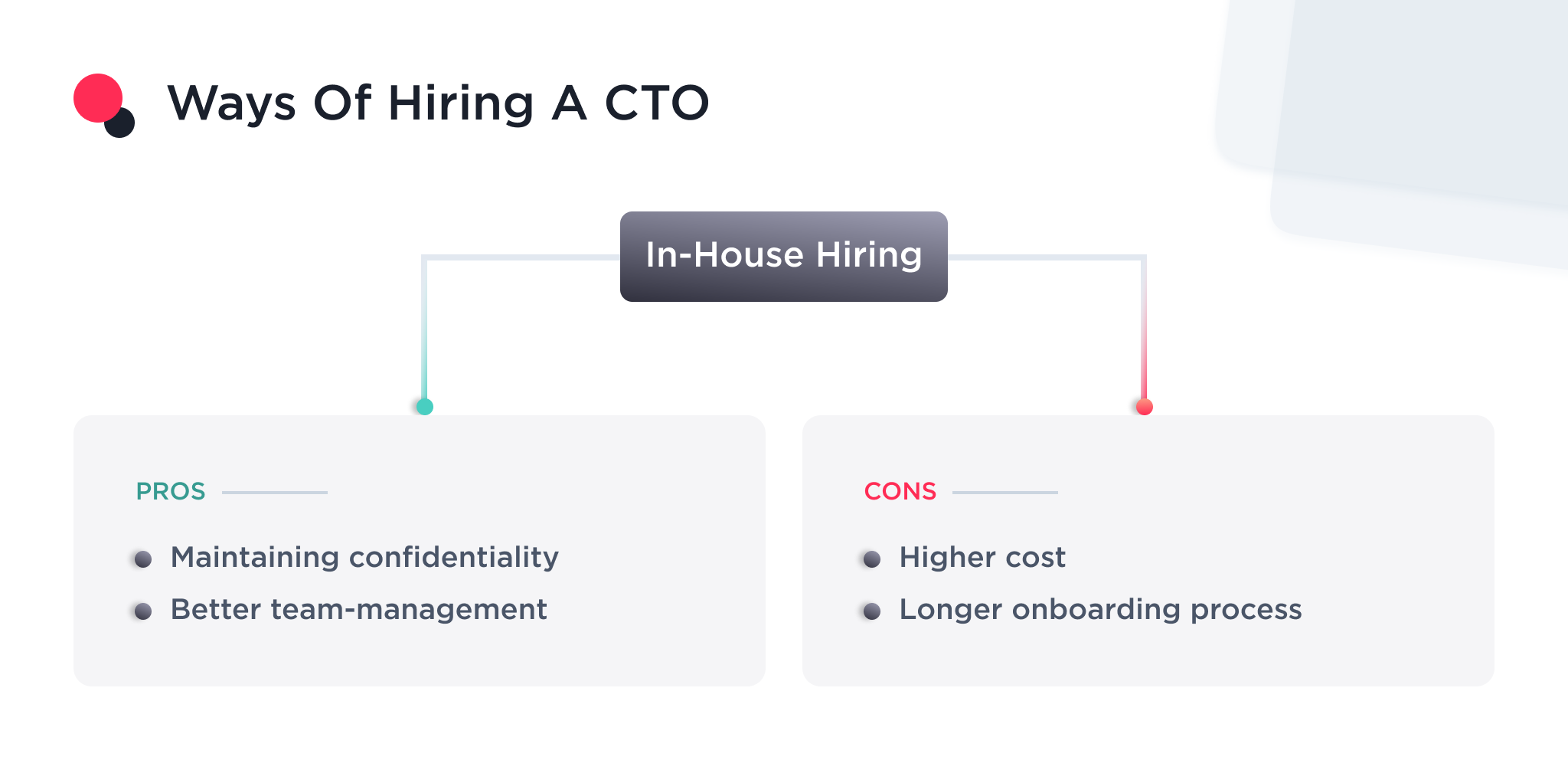
Another option to consider is freelance CTOs, more technically called technical-director-as-a-service. Let’s dig in.
Option 2. Freelance or Technical-director-as-a-service
Freelance CTOs are independent professionals that manage a startup’s technical per-contract basis.
They’re individuals open to working with any organization for a stipulated time frame and projects.
This hiring model is suitable for startups with uncertain finances who want a flexible CTO for a specific project.
As with in-house hiring, this model also has its pros and cons.
Pros and Cons of Technical Director as a Service
Pros | Cons |
They’re flexible as startups can promptly terminate their contract without breaking employment laws.They have experience working across multiple niches and can offer insight into a startup’s development and maintenance practices. | Technical-director-as-a-service can abandon your project at a prompt.There’s a high risk of leaking sensitive information to a competitor.Possibility of the timezone and cultural barrier. |
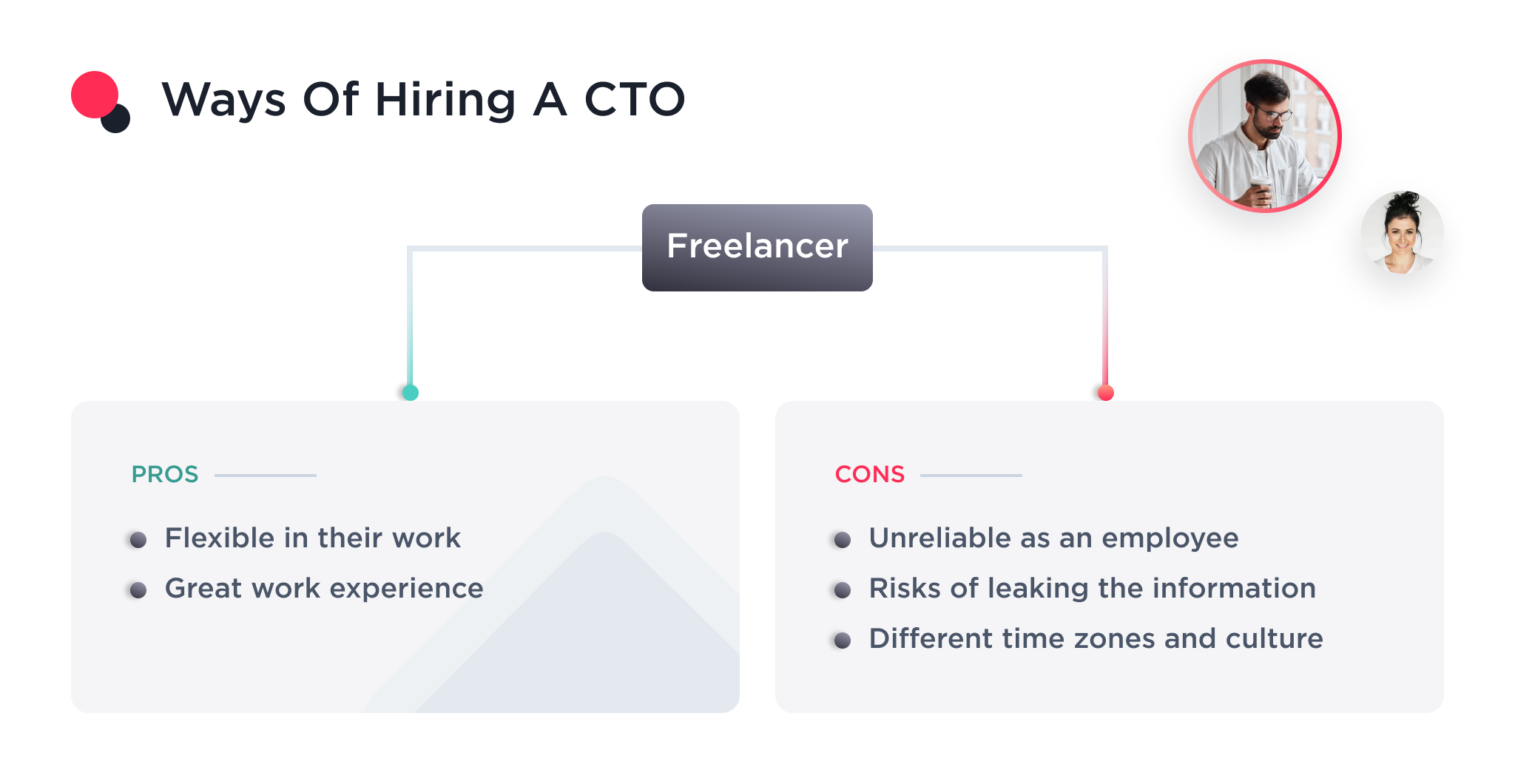
Another important option we’ll consider is outsourcing from a software development company.
Option 3. Outsourcing
This process entails hiring a CTO from a software vendor to manage internal technical employees, determine the roadmap for development processes, advise the CEO during decision-making processes, and coach team members.
This hiring model is best for companies that want a cost-effective yet flexible means of hiring CTO without the cons of freelance-as-a-service.
For a better understanding of this option, we’ll discuss its pros and cons.
Pros and Cons of Outsourcing
Pros | Cons |
Outsourcing from a reputable software development agency allows startups to select from a large pool of talent.Many software development agencies accept flexible payment options,It’s more cost-effective than other alternatives.Most agencies vet the skill set of their talents. Thus, you’re guaranteed top-notch expertise.Outsourced CTOs have experience working on multiple high-value projects. Thus, they can offer timely insights for your startup. | Time-zone barrier between agencies and startups at extreme ends. For example, India-based agencies and US-based startups.Cultural differences–are usually common between western startups and agencies in Africa and India. |
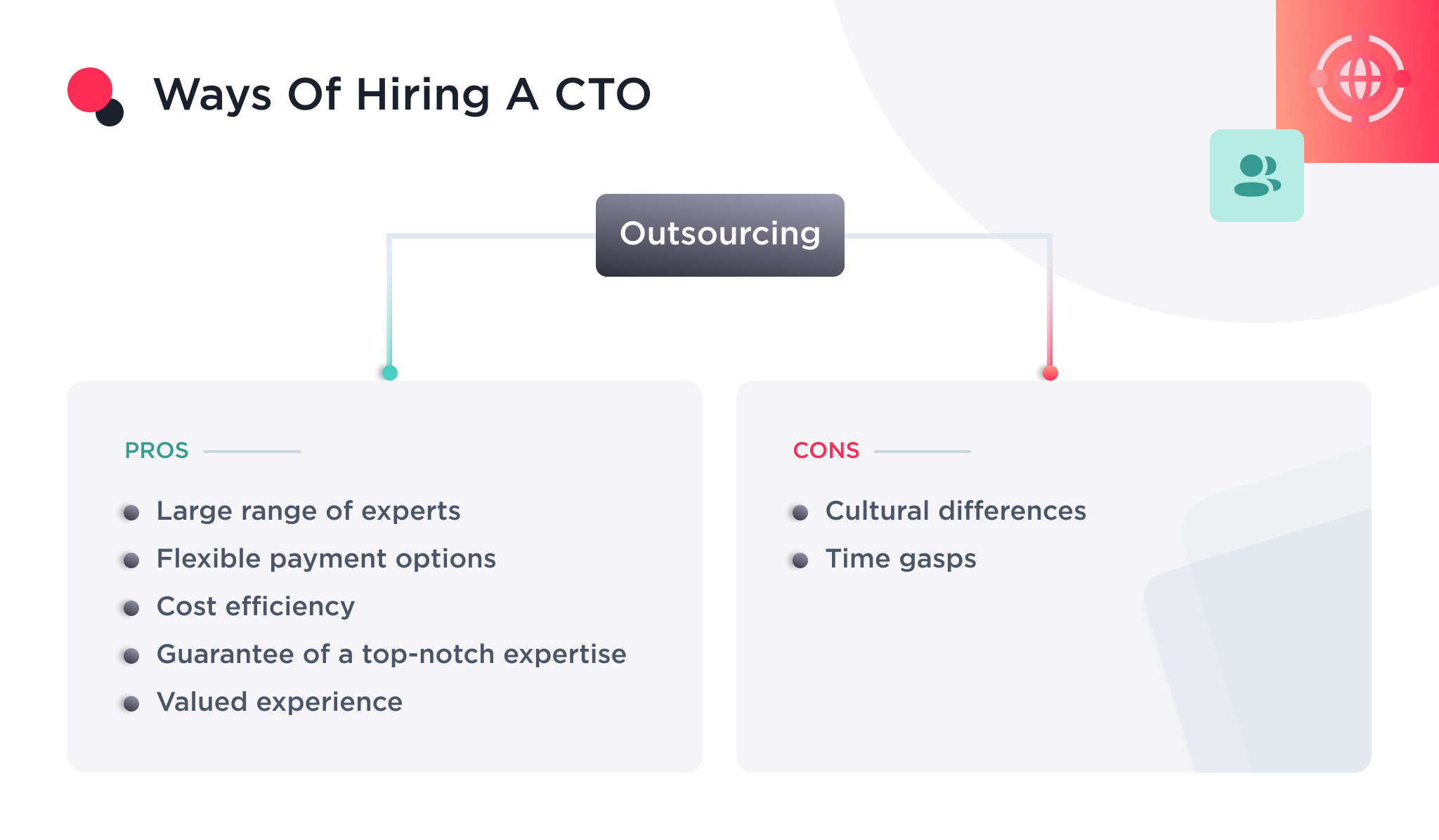
Read more about How to Hire a Chief Technical Officer here.
![How to Hire a Chief Technical Officer on Demand for Your Startup: [Overview, Process, Tips]](https://cdn.hashnode.com/res/hashnode/image/upload/v1689001796088/03bc6d0f-958c-4653-9a2c-c1ef8c4e2111.png?w=1600&h=840&fit=crop&crop=entropy&auto=compress,format&format=webp)